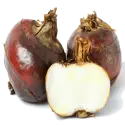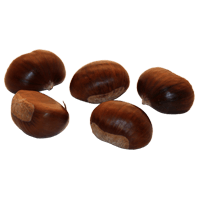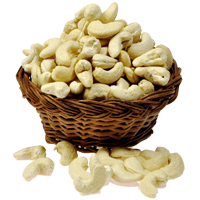Water Chestnuts Nutrition & Calories - Complete data of all nutrients

Introduction
We all confuse water chestnuts with chestnuts and are curious whether they are the same or have differences. Well, today, we’ll discuss the nutrition of water chestnuts in detail and discover what they are.
What Are Water Chestnuts?
Water chestnuts (Eleocharis dulcis), or Chinese water chestnuts, are aquatic vegetables that grow in marshes, ponds, paddy fields, and shallow lakes. Water chestnut is not a nut but a vegetable with a thick brown peel and an inner crisp white flesh high in water content, resembling chestnuts quite a lot.
Chinese water chestnut is not to be confused with another plant called water chestnut (Trapa natans s. bicornis), also known as water caltrop, devil pod, and singhara nut. These two species are entirely unrelated.
Nutrition
The nutritional infographics below are presented for 100g servings of raw Chinese water chestnuts or matai. However, we will also discuss the nutritional values of canned Chinese water chestnuts, including solids and liquids.
The average serving size of water chestnut per person is half a cup in slices, equaling 62g, or 4 water chestnuts, weighing approximately 36g.
Water chestnuts consist of 72% water and 23% carbohydrates. The other 5% is mostly made up of carbohydrates, vitamins, and minerals.
Macronutrients chart
Canned water chestnuts are less nutrient-dense, comprising 86% water, thus providing lower levels of all nutrients.
Calories
Water chestnuts are considered to be a low-calorie food.
100g of Chinese raw water chestnut provides 97 calories. An average serving per person (62g) contains even fewer calories - about 60.
The calorie content of canned water chestnuts is only 50.
Carbohydrates
While carbohydrates are the main nutrients found in water chestnuts, they still have a relatively moderate carb content. They provide 23.94 g carbs per 100g, which is 1.2 times less than the carb content of rice.
Net Carbs and Dietary Fiber
The predominant part of the total carb content in water chestnuts is net carbs - 20.94g per 100g or 87%. Most of the net carbs, in turn, are made up of starch.
The other 23%, or 3g per 100g, is dietary fiber. Water chestnuts fall in the top 27% of foods as a source of fiber, covering 12% of the daily needed value per 100g serving.
Protein and Fats
Water chestnuts have a low level of protein - 3g per 100g and 1.86g per average serving size.
Water chestnuts also contain only a negligible amount of fats - 0.1g per 100g serving.
These nuts have tiny amounts of saturated, monounsaturated, and polyunsaturated fats. They contain no trans fats, often considered the most harmful fat for your health.
Fat type information
As with all plant-based foods, water chestnuts contain no cholesterol.
Vitamins
Water chestnuts have a moderate amount of vitamins. These nuts can be a good source of vitamin C and vitamin B6 (pyridoxine).
Water chestnuts provide moderate levels of vitamin B1 (thiamine), vitamin B2 (riboflavin), and vitamin E and relatively low amounts of vitamin B9 (folate), vitamin B3 (niacin), and vitamin K.
Water chestnuts completely lack vitamin A, vitamin D, and vitamin B12.
Vitamin coverage chart
Minerals
Water chestnuts are rich in minerals. They have a particularly high amount of potassium (584 mg per 100g) and copper (0.326mg per 100g). These nuts fall in the top 10% of foods as a source of potassium and in the top 24% for copper.
The amounts of manganese (0.331 mg per 100g) and magnesium (22 mg per 100g) in water chestnuts are moderate.
Water chestnuts have relatively low levels of calcium, phosphorus, zinc, selenium, iron, and choline.
Water chestnuts are low in sodium.
Mineral coverage chart
Flavonoids
According to one study, water chestnuts contain flavonoids, such as anthocyanin, isoflavones, and flavonols, with potent antioxidant activities. These antioxidants protect your cells from free radical damage linked to various chronic diseases; they can also inhibit the α-glucosidase enzyme (1).
Water chestnuts may be effective against several types of cancer. According to research, flavanoids can effectively block the growth of neoplastic cells (2).
Non-starch Polysaccharides
According to research, water chestnuts are high in non-starch polysaccharides, contributing to their antioxidant quality. Besides, insoluble non-starch polysaccharides, such as cellulose and hemicellulose, are effective laxatives. These compounds can lower plasma cholesterol levels while helping to normalize blood glucose and insulin levels, making these polysaccharides a part of dietary plans to treat cardiovascular disease and type 2 diabetes (3).
Phenolic Compounds
Water chestnuts have a high total phenolic content. Gallocatechin gallate, epicatechin gallate, and catechin gallate are the main phenolic compounds in water chestnuts. They also contain anthocyanins, proanthocyanidins, and isoflavones in low amounts (4).
These compounds have potent antioxidant properties and have been shown to protect against illnesses associated with free radical formation, such as cardiovascular diseases and cancer (2).
Puchiin
Puchiin is a bacteriostatic substance found primarily in water chestnuts. It is considered the second plant-derived antibacterial substance after penicillin.
Puchiin has potent antibacterial properties and functions similarly to penicillin in aiding immune function. Although puchiin has been discovered for a long time, the qualification and quantification of antibacterial activity-contributed components remain limited (3).
Sterols
Water chestnut consumption daily significantly reduced total and low-density lipoprotein ("bad") cholesterol levels. According to studies, water chestnuts contain brassicasterol, coprostanol, and beta-sitosterol. Beta-sitosterol can lower blood cholesterol levels by competing with cholesterol absorption in the body (3).
Acidity
The acidity of water chestnut can be measured by looking at its potential renal acid load or PRAL value. Water chestnuts have a PRAL value of -10, making them an alkaline-producing food. The lower this number is, the more alkaline the food produces inside the body.
Comparison to Similar Foods
We compared water chestnuts to other foods in our database and highlighted what nutritional benefits each has.
Water chestnuts have a lower sodium and saturated fat content compared to chestnuts.
Water chestnuts have higher vitamin, mineral, and protein content than jicama.
In comparison with radishes, water chestnuts are lower in sodium and saturated fat content.
Water chestnuts are lower in sugars and saturated fats and richer in vitamins when compared to watercress.
Top nutrition facts for Water chestnuts

| Calories ⓘ Calories for selected serving | 97 kcal |
| Net Carbs ⓘ Net Carbs = Total Carbohydrates – Fiber – Sugar Alcohols | 21 grams |
| Default serving size ⓘ Serving sizes are mostly taken from FDA's Reference Amounts Customarily Consumed (RACCs) | 0.5 cup slices (62 grams) |
| Acidity (Based on PRAL) ⓘ PRAL (Potential renal acid load) is calculated using a formula. On the PRAL scale the higher the positive value, the more is the acidifying effect on the body. The lower the negative value, the higher the alkalinity of the food. 0 is neutral. | -10 (alkaline) |
| Oxalates ⓘ https://www.hsph.harvard.edu/nutrition-questionnaire-service-center/nutrient-tables-download-page/ | 1 mg |
Water chestnuts calories (kcal)
| Calories for different serving sizes of water chestnuts | Calories | Weight |
|---|---|---|
| Calories in 100 grams | 97 | |
| Calories in 4 waterchestnuts | 35 | 36 g |
| Calories in 0.5 cup slices | 60 | 62 g |
| Calories for different varieties of water chestnuts | Calories | Weight |
|---|---|---|
| Waterchestnuts, chinese, (matai), raw (this food) | 97 | 100 g |
| Waterchestnuts, chinese, canned, solids and liquids | 50 | 100 g |
Mineral chart - relative view
Vitamin chart - relative view
Fiber content ratio for Water chestnuts
All nutrients for Water chestnuts per 100g
| Nutrient | Value | DV% | In TOP % of foods | Comparison |
| Vitamin A | 0µg | 0% | 100% | |
| Calories | 97kcal | 5% | 74% |
2.1 times more than Orange
|
| Protein | 1.4g | 3% | 82% |
2 times less than Broccoli
|
| Fats | 0.1g | 0% | 93% |
333.1 times less than Cheese
|
| Vitamin C | 4mg | 4% | 31% |
13.3 times less than Lemon
|
| Net carbs | 21g | N/A | 31% |
2.6 times less than Chocolate
|
| Carbs | 24g | 8% | 31% |
1.2 times less than Rice
|
| Cholesterol | 0mg | 0% | 100% |
N/A
|
| Vitamin D | 0µg | 0% | 100% |
N/A
|
| Magnesium | 22mg | 5% | 54% |
6.4 times less than Almonds
|
| Calcium | 11mg | 1% | 74% |
11.4 times less than Milk
|
| Potassium | 584mg | 17% | 10% |
4 times more than Cucumber
|
| Iron | 0.06mg | 1% | 94% |
43.3 times less than Beef broiled
|
| Sugar | 4.8g | N/A | 48% |
1.9 times less than Coca-Cola
|
| Fiber | 3g | 12% | 27% |
1.3 times more than Orange
|
| Copper | 0.33mg | 36% | 24% |
2.3 times more than Shiitake
|
| Zinc | 0.5mg | 5% | 69% |
12.6 times less than Beef broiled
|
| Phosphorus | 63mg | 9% | 73% |
2.9 times less than Chicken meat
|
| Sodium | 14mg | 1% | 83% |
35 times less than White bread
|
| Vitamin E | 1.2mg | 8% | 44% |
1.2 times less than Kiwi
|
| Manganese | 0.33mg | 14% | 43% | |
| Selenium | 0.7µg | 1% | 86% | |
| Vitamin B1 | 0.14mg | 12% | 41% |
1.9 times less than Pea raw
|
| Vitamin B2 | 0.2mg | 15% | 46% |
1.5 times more than Avocado
|
| Vitamin B3 | 1mg | 6% | 69% |
9.6 times less than Turkey meat
|
| Vitamin B5 | 0.48mg | 10% | 60% |
2.4 times less than Sunflower seeds
|
| Vitamin B6 | 0.33mg | 25% | 37% |
2.8 times more than Oats
|
| Vitamin B12 | 0µg | 0% | 100% |
N/A
|
| Vitamin K | 0.3µg | 0% | 84% |
338.7 times less than Broccoli
|
| Trans fat | 0g | N/A | 100% |
N/A
|
| Folate | 16µg | 4% | 52% |
3.8 times less than Brussels sprouts
|
| Choline | 36mg | 7% | 68% | |
| Saturated fat | 0.03g | 0% | 90% |
226.7 times less than Beef broiled
|
| Monounsaturated fat | 0g | N/A | 96% |
4899.5 times less than Avocado
|
| Polyunsaturated fat | 0.04g | N/A | 91% |
1097.1 times less than Walnut
|
| Caffeine | 0mg | 0% | 100% | |
| Omega-3 - EPA | 0g | N/A | 100% |
N/A
|
| Omega-3 - DHA | 0g | N/A | 100% |
N/A
|
| Omega-3 - DPA | 0g | N/A | 100% |
N/A
|
Check out similar food or compare with current
NUTRITION FACTS LABEL
Serving Size ______________
Health checks
Water chestnuts nutrition infographic

References
All the values for which the sources are not specified explicitly are taken from FDA’s Food Central. The exact link to the food presented on this page can be found below.



